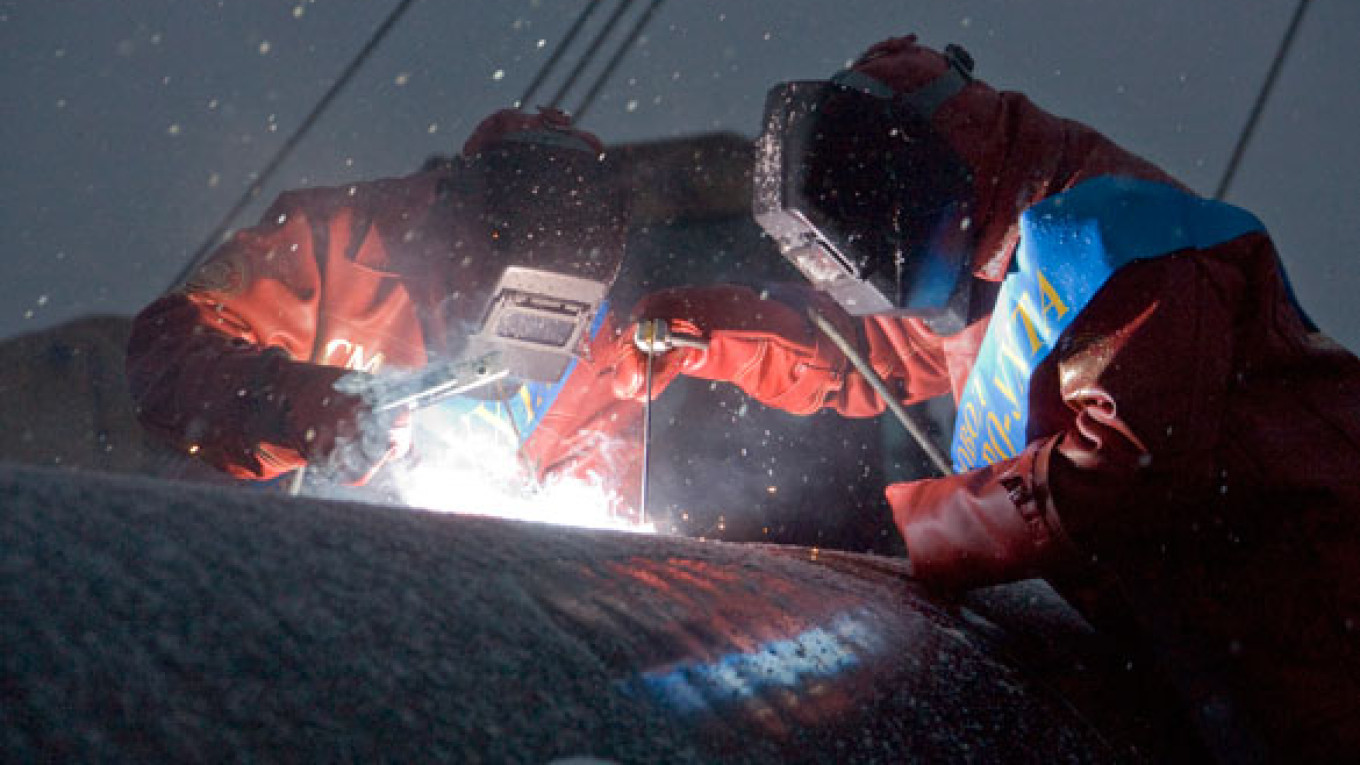Gazprom is spending money on useless pipelines that makes the $51 billion spent on the Sochi Olympics look modest, an opposition party investigation said.
The state-owned gas giant is lavishing billions of dollars on transportation infrastructure, including the South Stream pipeline to Europe, that will never be used even at half capacity, according to an expose presented by the co-chairman of the liberal RPR Parnas party, Boris Nemtsov, on Tuesday.
The monumental expenditures required for these mega-projects will be mostly covered by raising domestic gas prices, Nemtsov said, while a handful of businessmen close to President Vladimir Putin handsomely reward themselves with juicy construction contracts.
Last year, Nemtsov, a former energy minister and protege of former President Boris Yeltsin who fell out with Putin during his first term as president, published a similar investigation into corruption during Olympic construction in Sochi, charging that between $25 billion and $30 billion had been stolen. The government denies this.
The largest pipeline targeted in RPR Parnas's Gazprom investigation is South Stream, stretching from the huge Bovanenkovo gas field on the Yamal Peninsula in northwest Siberia south through central Russia, across the Black Sea into southeastern Europe.
“The cost of laying the whole pipeline is estimated at about 3 trillion rubles ($85 billion) — twice the amount spent on Sochi Olympic construction,” Nemtsov said, and it is not even necessary.
Russian gas exports to Europe do not exceed 170 billion cubic meters, even in record years, he said. Existing capacity, including the North Stream pipeline, which traverses the Baltic Sea into northern Germany, is more than 250 billion cubic meters. The South Stream would provide an additional 60 billion cubic meters, meaning overall capacity will exceed transported volumes twice over.
Gas from Bovanenkovo could have been carried via the existing infrastructure, creating a link to the Yamburg workers settlement located at the base of the Yamal peninsula, which has access to a pipeline, said Mikhail Krutikhin, partner and analyst at consultants RusEnergy. “But the most technically difficult and expensive route was chosen instead,” he said.
Even for Gazprom, which evolved out of the Soviet Ministry of Gas Industry in 1989, the sums involved are not small change. The company, which has frequently been criticized for ineffective management, generated profits of 1.21 trillion rubles in 2012 on sales of 4.76 trillion rubles, according to its financial statements.
Gazprom is unapologetic about South Stream, saying that the pipeline is necessary for Europe’s energy security. In the past, gas deliveries to EU countries have been held up by disputes with transit countries, most famously Ukraine, that the new pipeline will bypass.
Another project in the works — this time in Russia’s East — is a pipeline that would link the Kovyitkinskoye gas field north of Lake Baikal with Blagoveschensk, Khabarovsk and Vladivostok to the east, creating a gas supply corridor to China. The estimated cost of the project stands at 1.4 trillion rubles. Its logic is disputed.
“A pipeline already exists going from Sakhalin to Khabarovsk and Vladivostok, which at one end does not have enough gas to fill it to capacity, and at the other — no contract with China,” Krutiknin said.
So far, the construction has been postponed, but the idea has not been abandoned.
Gazprom is currently negotiating a major export deal with China that it hopes to clinch in May. Nemtsov, however, is skeptical — Gazprom has been working on a China deal for 10 years, he said.
Most of these hyper-expensive pipeline projects are lobbied by two people, “old friends of Putin” Ziyad Manasir and Arkady Rotenberg, who respectively control Stroigazconsulting and Stroigazmontazsh, Gazprom’s major subcontractors in pipeline construction, Nemtsov said.
While these two and a select few other businessmen loyal to the Kremlin skim off the cream from the construction spree, the spiraling costs of building overcapacity into the country’s gas infrastructure will eventually be covered by Russian taxpayers, just as in the case of Sochi construction, Nemtsov said.
“The government aims to raise domestic gas prices in line with what Europe is paying on average,” Nemtsov said. “This is gradually happening. The price of gas on the domestic market is already over the $100 per thousand cubic meters that U.S. consumers pay.”?
Contact the author at [email protected]
A Message from The Moscow Times:
Dear readers,
We are facing unprecedented challenges. Russia's Prosecutor General's Office has designated The Moscow Times as an "undesirable" organization, criminalizing our work and putting our staff at risk of prosecution. This follows our earlier unjust labeling as a "foreign agent."
These actions are direct attempts to silence independent journalism in Russia. The authorities claim our work "discredits the decisions of the Russian leadership." We see things differently: we strive to provide accurate, unbiased reporting on Russia.
We, the journalists of The Moscow Times, refuse to be silenced. But to continue our work, we need your help.
Your support, no matter how small, makes a world of difference. If you can, please support us monthly starting from just $2. It's quick to set up, and every contribution makes a significant impact.
By supporting The Moscow Times, you're defending open, independent journalism in the face of repression. Thank you for standing with us.
Remind me later.


